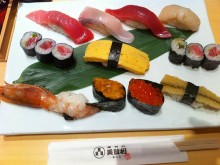
Suffering from Gallbladder problems can be a painful and rather stressful experience, and the situation is certainly not going to be made any more pleasant if you find out you need to cut down on your favorite dishes, but because diet can play a huge roll in the well being of the gallbladder, it is important to do some research and find out what type of food it is best to stay clear of regardless of how great it tastes.
Sushi is enjoying a surge of popularity in the United States and Europe, and much of it's popularity is down to the health benefits associated with this style of cuisine. However, when it comes to looking after your gallbladder, it's not healthy food fads that'll get you back in shape; so firstly we'll look at what exactly causes gallbladder problems so we'll know exactly what dietary changes are needed (if any).
What Causes Gallbladder Problems?
The gallbladder is an organ in the human body that works closely with the liver; it's main job is to store bile, a substance that the liver creates to breakdown fats, waxes and fat soluble vitamins in the small intestine as part of the digestive process. When we eat, hormone signals trigger the gallbladder into action, releasing enough bile to help us in the digestion and breakdown of our food.
Bile naturally contains cholesterol but significantly high levels, coupled with calcium, can cause bile to crystalize or harden which causes blockage of the gallbladder. This condition causes acute pain, discomfort and pressure in the surrounding area.
Certain factors that might cause an increased risk of gallbladder problems are unfortunately unavoidable; these include gender, ethnicity, heredity, and underlying conditions such as diabetes or certain types of anemia. However there are a number of factors that we can control through simple lifestyle changes and healthy living; these include drinking, smoking, lack of exercise, estrogen intake, obesity, sudden weight gain or weight loss, and diet.
When it comes to making dietary adjustments to control gallbladder problems the thing to look out for is a diet high in fat and cholesterol, and low in fiber, and this means avoiding anything that is deep fried or has a high fat content, with the consumption of egg being one of the biggest no-no's.
Can I Order Some Sushi Then?
Considering sushi has somewhat of a reputation for being fresh and healthy you should be giving yourself the green light to put it back on the menu, but just before you start practicing your chopstick skills there are a few things you should keep in mind when having a look through the mouth-watering menu at your favorite sushi bar: Firstly, although sushi is well known for its use of raw fish such as salmon and tuna which is high in omega 3 and great for looking after your liver and gallbladder, there are ingredients such as inari (sweet deep fried tofu), fried chicken and fried duck which are not going to do your gallbladder any good and should probably be avoided. Also, a lot of Japanese food contains gluten which is also not great for the gallbladder. So, whilst a visit to you local sushi restaurant is still a great idea, it may be worth speaking with the staff and getting them to give you a little bit more information about the menu. The idea to keep in mind is that just like eating a salad can be great for you, ordering a Caesar salad with extra bacon and drowned in dressing defeats the point of ordering a salad in the first place. Whilst every person will react differently to eating different foods, the internet is full of useful sites like this online Gallbladder diet which can help you create a list of healthy foods you can enjoy.